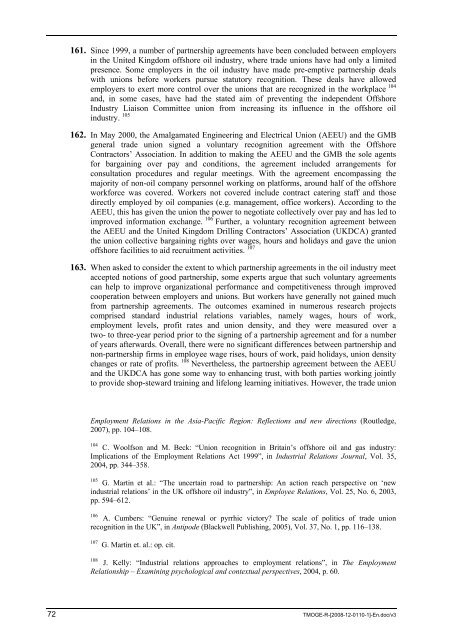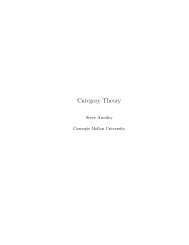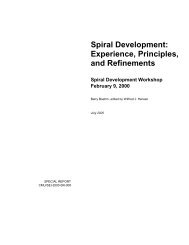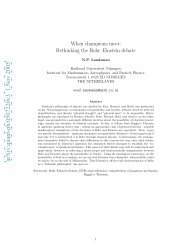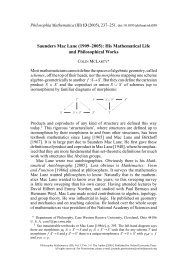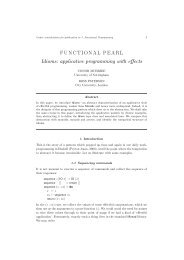wcms_161662
wcms_161662
wcms_161662
You also want an ePaper? Increase the reach of your titles
YUMPU automatically turns print PDFs into web optimized ePapers that Google loves.
161. Since 1999, a number of partnership agreements have been concluded between employers<br />
in the United Kingdom offshore oil industry, where trade unions have had only a limited<br />
presence. Some employers in the oil industry have made pre-emptive partnership deals<br />
with unions before workers pursue statutory recognition. These deals have allowed<br />
employers to exert more control over the unions that are recognized in the workplace 104<br />
and, in some cases, have had the stated aim of preventing the independent Offshore<br />
Industry Liaison Committee union from increasing its influence in the offshore oil<br />
industry. 105<br />
162. In May 2000, the Amalgamated Engineering and Electrical Union (AEEU) and the GMB<br />
general trade union signed a voluntary recognition agreement with the Offshore<br />
Contractors’ Association. In addition to making the AEEU and the GMB the sole agents<br />
for bargaining over pay and conditions, the agreement included arrangements for<br />
consultation procedures and regular meetings. With the agreement encompassing the<br />
majority of non-oil company personnel working on platforms, around half of the offshore<br />
workforce was covered. Workers not covered include contract catering staff and those<br />
directly employed by oil companies (e.g. management, office workers). According to the<br />
AEEU, this has given the union the power to negotiate collectively over pay and has led to<br />
improved information exchange. 106 Further, a voluntary recognition agreement between<br />
the AEEU and the United Kingdom Drilling Contractors’ Association (UKDCA) granted<br />
the union collective bargaining rights over wages, hours and holidays and gave the union<br />
offshore facilities to aid recruitment activities. 107<br />
163. When asked to consider the extent to which partnership agreements in the oil industry meet<br />
accepted notions of good partnership, some experts argue that such voluntary agreements<br />
can help to improve organizational performance and competitiveness through improved<br />
cooperation between employers and unions. But workers have generally not gained much<br />
from partnership agreements. The outcomes examined in numerous research projects<br />
comprised standard industrial relations variables, namely wages, hours of work,<br />
employment levels, profit rates and union density, and they were measured over a<br />
two- to three-year period prior to the signing of a partnership agreement and for a number<br />
of years afterwards. Overall, there were no significant differences between partnership and<br />
non-partnership firms in employee wage rises, hours of work, paid holidays, union density<br />
changes or rate of profits. 108 Nevertheless, the partnership agreement between the AEEU<br />
and the UKDCA has gone some way to enhancing trust, with both parties working jointly<br />
to provide shop-steward training and lifelong learning initiatives. However, the trade union<br />
Employment Relations in the Asia-Pacific Region: Reflections and new directions (Routledge,<br />
2007), pp. 104–108.<br />
104 C. Woolfson and M. Beck: “Union recognition in Britain’s offshore oil and gas industry:<br />
Implications of the Employment Relations Act 1999”, in Industrial Relations Journal, Vol. 35,<br />
2004, pp. 344–358.<br />
105 G. Martin et al.: “The uncertain road to partnership: An action reach perspective on ‘new<br />
industrial relations’ in the UK offshore oil industry”, in Employee Relations, Vol. 25, No. 6, 2003,<br />
pp. 594–612.<br />
106 A. Cumbers: “Genuine renewal or pyrrhic victory? The scale of politics of trade union<br />
recognition in the UK”, in Antipode (Blackwell Publishing, 2005), Vol. 37, No. 1, pp. 116–138.<br />
107 G. Martin et. al.: op. cit.<br />
108 J. Kelly: “Industrial relations approaches to employment relations”, in The Employment<br />
Relationship – Examining psychological and contextual perspectives, 2004, p. 60.<br />
72 TMOGE-R-[2008-12-0110-1]-En.doc/v3


